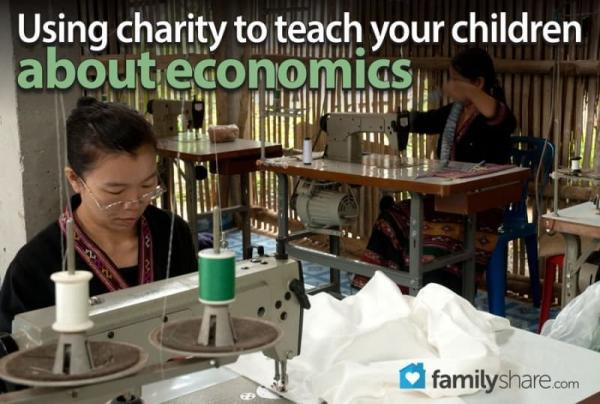
My sister is taking a business course in which she has to start a small business with only $20 start-up capital. Whatever profit she makes is donated to a budding entrepreneur as a microfinance investment loan. She is thrilled at this prospect and has already chosen her recipient, a farmer in Armenia.
This got me thinking about how we can teach our families to give monetarily. Most of us already do service projects, even though we may not call them that (helping someone with yardwork, taking a meal, babysitting, etc.), but we should also teach them to investigate and give from the pocket book as well as from the heart. Microfinance is a good way to do that.
Microfinance is a relatively new idea, having its roots in the 1800's when theorist, Lysander Spooner, and European credit union founder, Friedrich Wilhelm Raiffeisen, independently came up with ideas to give small credits to farmers and business owners to pull them out of poverty.
Modern microfinance is often credited to Dr. Mohammad Yunus, who began experimenting with lending to poor women in the village of Jobra, Bangladesh during his tenure as a professor of economics at Chittagong University in the 1970s. He would go on to found Grameen Bank in 1983, and win the Nobel Peace Prize in 2006.
Microfinance is an alternative to traditional lending institutions such as commercial banks, which would almost never loan money to someone with no assets to speak of.
The idea behind microfinance is that you contribute into an MFI (Microfinance Institution) as little as $20.00. These contributions are collected and used to underwrite a loan which has been pre-dispersed to a worthy cause, such as an Indonesian woman who makes aprons, or in my sister's case, an Armenian farmer. The applicants and recipients are folks with motivation and drive, but no means to either start or grow their business. By using microfinance options, they are often able to grow to the point that they can hire others in their village to work with them.
The upside to microfinance:
-
Helps individuals who would not otherwise be able to acquire start-up funds from a traditional lender.
-
Small donations go a long way toward supporting the impoverished in becoming self-reliant.
-
When loans are paid back, that money can go toward another person's dream.
-
You are generally able to follow the progress of the recipient.
-
The programs has helped millions of individuals and families to not only become self-reliant, but to employ others.
Thoroughly investigate the MFIs before selecting one. Here is what to watch out for:
-
Make sure you have access to their records and are able to follow your donation's progress.
-
Check the interest rate. The global average is 36%, but some MFIs charge as much as 70%.
-
Investigate their management and make sure there is a clear line of authority and accountability.
-
Check in with other donors and get their opinions.
There are quite a few MFIs out there. Some are specific to certain areas of the world and others are global. There are even some that work person-to-person, independent of an MFI. Here is a list of some of the most well-known MFIs:
Use your favorite search engine to look for microfinance organizations and then do your research. Statistics show that there are over a billion people living on less than $1.00 a day. Here's a way for your family to help another family achieve their dreams and enjoy the thrill of self-sufficiency. They have the drive. You send a little support and everybody wins.
Here's how to start:
-
Assign family members to investigate potential recipients and then reconvene with your findings.
-
Pray, vote and decide whether sponsoring someone with microfinance is the right king of service project for you and your family.
-
If you give your children an allowance, offer them the opportunity to give a small percentage of their allowance to contribute as a family.
-
As a family, check in on the progress of the person you are sponsoring and share your thoughts on the changes you have made in their life.
Giving of themselves is one of the most important lessons we can teach our children. When they perform charitable activities as children, it helps them become compassionate and thoughtful adults.
This article was originally published on FamilyShare.com. Check out these other related articles: 6 reasons why you should donate to charities, How much money can we afford to give to charity? and How do I evaluate a charity before making a donation?

